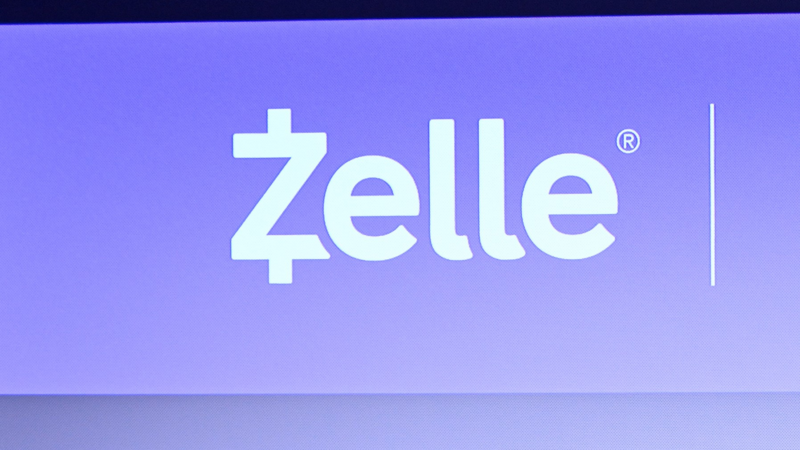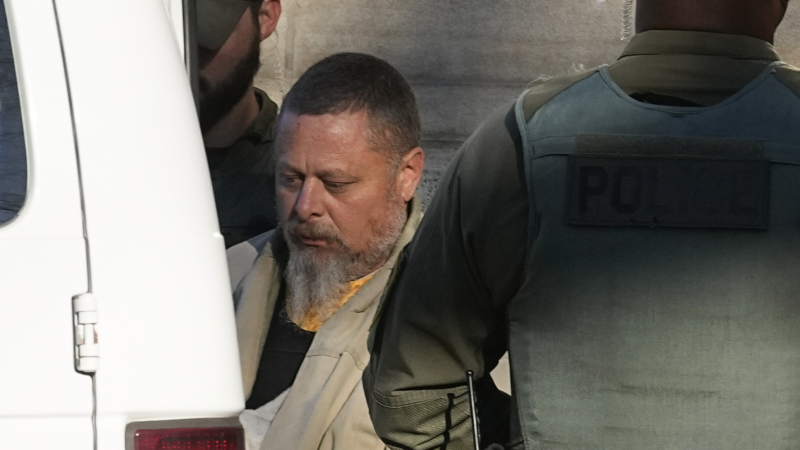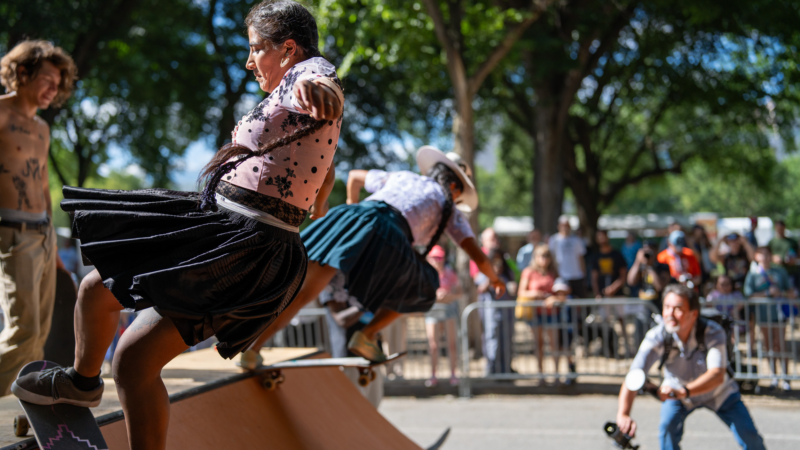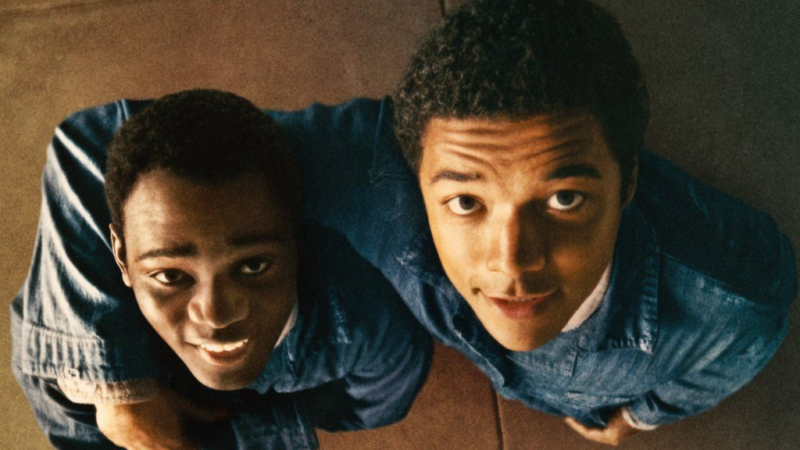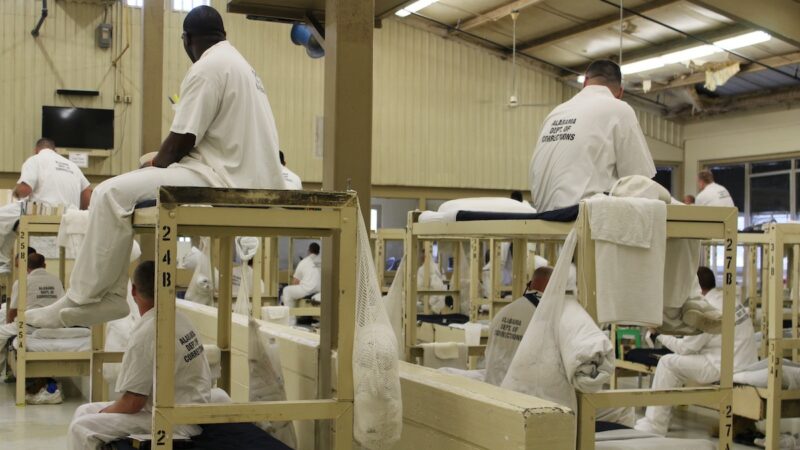Trump’s reelection victory pushes some LGTBQ Minneapolis residents to safety training

The morning after Election Day, Kimmy Hull woke up to find that her inbox had been bombarded overnight.
“There was over a hundred emails from people asking about our permit to carry classes,” said Hull.
Hull, a former private security guard who is also half-Asian and lesbian, has devoted herself to keeping communities of color and her LGBTQ neighbors safe in Minneapolis. Her company, Sequeerity, offers de-escalation services, community defense classes and firearms instruction. But Hull said the post-election surge in clients looking for gun training signals a new feeling of urgency.
“At least half of them are like, ‘You know, we thought about getting a gun, you know, back during the uprising and everything,’ ” she said, referring to the social justice protests in Minneapolis that followed the 2020 police killing of George Floyd, ” ‘and… we wanted to sit back and see what happened. …’ And as soon as [Trump] got reelected, we decided that it’s not about whether they want one or not. They feel like they have to have one.”
Trans people are less than 1 percent of all U.S. adults, but they have increasingly been in the crosshairs of right-wing efforts to limit their rights and public visibility. Between June 2023 and 2024, hate incidents against LGBTQ people more than doubled over the prior year, according to data collected by GLAAD, an LGBTQ media watchdog and advocacy nonprofit. Of those 1,109 incidents, trans and queer people were disproportionately targeted.
And during the 2024 election cycle, Republicans spent roughly $230 million on anti-trans television advertisements, according to data collected by AdImpact. State-level legislation targeting trans rights has also mushroomed, more than tripling from 2022 to 2023, which saw 615 measures considered. These bills have largely built off of false claims that portray trans people either as hapless victims of profit-driven medical practices or as predators of children.
Trump has also promised to further restrict trans rights, including access to gender-affirming care and Title IX protections for transgender students.
In a statement to NPR, Trump-Vance transition spokeswoman Karoline Leavitt wrote that, “President Trump will serve ALL Americans, even those who did not vote for him in the election.”
But still, because of Trump’s election victory, many trans Americans are reconsidering how they maintain day-to-day safety. Many from within the community are falling back onto a long-held motto: We keep us safe. Sequeerity represents an unusually public-facing example of these efforts to help local trans neighbors acquire skills and access resources for self-defense.

“And the scary part about this is that this is Minneapolis, Minnesota,” said Hull. “We are one of the safest states for trans communities, and our trans communities are buying guns because they don’t feel safe.”
“We’re going to lose people”
On a December night that even hardened Minnesotans called cold, roughly two dozen people balanced pizza on paper plates and took seats in a large circle around a concert floor. They were there to learn about community defense — how to keep themselves and their neighbors safe against harassment or worse. The group, mostly young people, cut across racial and gender categories.
Hull ran the meeting, along with Sequeerity’s CEO, Sam Koshiol-Wright.
“Quite frankly, we’re going to lose people,” Hull told the group, underscoring how seriously she sees the backlash against trans and minority identities. “So my hope is that we can limit the amount of damage that our communities are going to take on in the next four years.”
Over the course of 90 minutes, Hull and Koshiol-Wright led the group through discussions about developing situational awareness, a practice of continually observing one’s environment to assess risks and make informed decisions around safety. They emphasized the importance of “podding up,” by which they meant building networks of friends and neighbors who could lean on each other for help with everything from grocery shopping to emergency medical care. Throughout, the emphasis was on building personal skills and strengthening community, rather than calling on state resources like the police.
Hull is not the only one hearing from people who fear for their safety. Roxanne Anderson, a co-organizer of this community defense meeting, said she has, too. Anderson is director of Our Space, a campaign that is working to establish an LGBT community center in Minneapolis.
“When our [government] policies don’t kind of reflect a protective nature, then people … take it upon themselves to make sure that they can protect themselves,” said Anderson. “I think people have just begun to realize that not only is there a need to protect themselves individually, but we also have to have greater strides in community protection.”
Minnesota has some of the nation’s strongest protections for trans people. Officially a “trans refuge state,” it has codified trans people’s right to access medical care and their freedom from discrimination. Still, trans people in the state continue to experience violence. Early in November, two trans women were attacked at a light rail station in Minneapolis. In the spring, a trans high school student in Minnetonka had her jaw broken in an assault by another student.
By the end of the meeting, the group collectively agreed to hold ongoing, bimonthly trainings. The tips that Hull and Koshiol-Wright dispense in these trainings are all nonviolent, common-sense practices. But since 2020, Sequeerity has also been ready to offer further services to those who believe they need more than that to stay safe.
“Better to be safe than sorry”
Hull also schedules one-on-one sessions with people who have completed a 4-hour, online permit to carry course. One trainee, Jayce, is a 35-year old former school teacher and a trans, Black man. He asked that only his first name be used out of concern for his safety.
“You know, with kids in my house, I never really thought I would own a gun or want one in my home,” Jayce said, “but with things in the state that they are, [it] just seems better to be safe than sorry.”

Hull, the daughter of a Vietnam War veteran, grew up using guns. But she said she realized during the George Floyd uprising that other people from marginalized backgrounds needed a culturally-sensitive introduction to firearms.
“Our permit to carry [class]… covers everything we’re absolutely required to cover, but we also gear it specifically with best practices and tips on how to handle being a gun owner as a person of color, as a queer person, as somebody who is not of the norm,” said Hull. “Because it looks very, very different when a white dude who’s carrying a gun gets pulled over by a cop compared to a young Black man who’s carrying a gun getting pulled over by the same cop.”
For Jayce, that risk is baked into his calculus — he decided that it may ultimately be safer in the coming years to have a gun than it will be not to have one.
“It’s been said that there’s going to be all these things that [the Trump administration is] going to try to undo as far as rights for [trans] folks,” said Jayce. “If that kind of rhetoric emboldens people to try to cause harm, it feels safer to be prepared.”
Protecting the Proud Boys
Unlike many grassroots networks that have emerged to protect the LGBTQ community, Sequeerity is a for-profit business. Hull charges for firearms training, and she also hires out staff and contractors to de-escalate tensions that may arise at gatherings such as Pride celebrations and drag events. During “festival season,” starting in April and through the fall, when the company staffs up to six events in a day.
“What we do is we look for warning signs. We look for heightened behaviors, heightened attitudes, feelings,” explained Hull. “And then when we encounter them, we approach it in a gentler, I call it the ‘soft touch’ way, where you just stop in and just check in with people.”

Recently, Koshiol-Wright and two other Sequeerity de-escalators were on hand at the Minnesota State Capitol. They had been hired by Gender Justice, a legal and advocacy organization, to head off any tensions that might unfold during or after that morning’s oral arguments before the Minnesota Supreme Court. The high court was hearing a landmark case concerning a trans athlete’s exclusion from women’s powerlifting events.
“Really, our role is to allow people to have their freedom of speech, to allow them to have their… First Amendment [rights],” said Koshiol-Wright. She and her two colleagues wore casual black jeans and black hooded sweatshirts with “Sequeerity” spelled across the front. Although firearms are allowed into the Minnesota State Capitol, they did not carry guns.
Instead, Koshiol-Wright unzips a cross-body bag to show what she carries inside.
“I’ve got gum, Uncrustables. … This is my favorite fidget toy,” she said, pulling out a squidgy, pink stress cube. “You know, I have used all of these things in lots of different ways.”
During the last two legislative sessions, Koshiol-Wright said Sequeerity was frequently at the state capitol on days that lawmakers were considering trans rights bills. She said that even though supporters and opponents of those bills were passionate, Sequeerity was able to help defuse tensions by monitoring behaviors that might provoke physical conflict, and stepping in early to avert them. Sometimes this might involve simply talking someone down, or separating camps, or using snacks and toys to calm or distract someone.
Keeping the peace sometimes has pushed Hull and Sequeerity into unconventional territory. In July of 2022, after the U.S. Supreme Court overturned Roe v. Wade, pro-abortion access protesters rallied in the thousands at the Minnesota State Capitol. Hull said the challenge was that some members of the Proud Boys showed up, too.
“And see, the thing is, you can carry a firearm to the Capitol, right? So all these Proud Boys and they’re showing up there with guns,” she said, “and we had to form a circle around the Proud Boys to keep the crowd from hitting them or kicking them or doing anything like that.”
Hull explained that this was actually about protecting pro-abortion access protesters.
“I’ll do whatever it takes to make sure that people get home, you know?,” she said. “If we’re out there and violence is happening, physical violence, [law enforcement is] not going to let us be able to go back out there, not to mention how many of our people are going to get hurt.”
Working with law enforcement
Hull also communicates with law enforcement agencies, sharing information about events that Sequeerity will be at and indications of potential threats targeting those gatherings. She acknowledges that, for some of the marginalized communities she works with, this coordination may not sit well. But Hull said she has to take a practical approach to safety.
“There’s no functioning society that doesn’t have an enforcement group of some sort,” she said.

Hull said she sees a clear division in what a de-escalation team like Sequeerity might do at an event, versus law enforcement or hired security services. She says her team focuses on keeping people safe and does not concern itself with the protection of property. When Sequeerity is unable to de-escalate someone who presents a threat, they notify on-site security officers.
Koshiol-Wright said some law enforcement departments have welcomed Sequeerity’s presence at high-tension events, and some others have not. At the capitol, she and state police chat with a friendly familiarity in the rotunda. A spokesperson for the Minnesota State Police department declined to comment on Sequeerity.
When it comes to the Minneapolis Police Department, Hull said that some officers have worked well in conjunction with Sequeerity, and some have not. But she said that Officer Derek Chauvin’s killing of George Floyd exposed nationally the dynamic that has led many people of color and LGBTQ residents to view the department as a danger, rather than as a protector.
The Minneapolis Police Department did not respond to an interview request from NPR. But a link on the agency’s website to an “LGBTQIA Liaison” leads to a 404 error page. It’s a stark display of the argument that underpins Sequeerity’s work: that marginalized communities currently, and in the next four years, will need to look to themselves for protection.
This story was made possible in part by the Pulitzer Center on Crisis Reporting.
Transcript:
AILSA CHANG, HOST:
In a few weeks, some Americans will celebrate the beginning of Donald Trump’s second term. For some others, the next four years will be filled with anxiety over personal safety. A group of people in Minneapolis is helping some neighbors feel more prepared. NPR domestic extremism correspondent Odette Yousef spent some time with them. And a warning to listeners, this story will contain the sound of gunshots.
ODETTE YOUSEF, BYLINE: Near where a police officer killed George Floyd four years ago, Kimmy Hull reaches down and rearranges a painting and a stuffy that had knocked over.
KIMMY HULL: The weather really took a toll.
YOUSEF: There are hundreds of items here left in remembrance. Like many in Minneapolis, Hull refers to the unrest that followed Floyd’s murder as the uprising.
HULL: The PD and state and everybody was like, oh, Minneapolis is rioting. You know, they’re setting on fire. And it’s just like, no, dude. We’re just sick of your [expletive]. We are rising up to make a stand, you know?
YOUSEF: It started with protests. But soon, Proud Boys and white nationalist biker gangs were terrorizing the neighborhood. And police abandoned the 3rd Precinct. Locals were on their own for safety.
HULL: A lot of people, and especially coming out of the marginalized communities, were looking to get firearms.
YOUSEF: At the time, Hull had stopped working as a private security guard. She had launched her own for-profit company called Sequeerity. It worked with LGBTQ and communities of color. She said her communities were struggling to find a culturally sensitive entry to the world of guns, so she became a certified instructor. Hull says the demand for training was steady until last month.
HULL: So Wednesday, the day after the election, I literally woke up at, like, 7 o’clock in the morning, opened up my email, and there was over a hundred emails from people asking about our permit-to-carry classes.
YOUSEF: Hull calls herself an introvert, but she’s a people person. She connects to folks, even ones who may not understand where a half-Vietnamese daughter of a U.S. veteran, formerly homeless, now sober lesbian may be coming from. Her new students have been telling her why they think now’s the time to get trained up.
HULL: At least half of them are like, you know, we thought about getting a gun back, you know, during the uprising and everything. And we just felt like firearms weren’t for us. We wanted to sit back and see what happened. And as soon as he got reelected, we decided that – it’s not about whether they want one or not. They feel like they have to have one.
YOUSEF: In other words, it’s a Donald Trump effect.
HULL: And the scary part about this is that this is Minneapolis, Minnesota. We are one of the safest states for trans communities, and our trans communities are buying guns because they don’t feel safe.
YOUSEF: Early in November, two trans women were attacked at a Minneapolis light rail station. This even though Minnesota is a trans refuge state – it protects trans people’s rights to medical care and bars discrimination against them. In many other states, it’s very different. Trans people are less than 1% of the U.S. population. But in 2023, there was an explosion of state bills to curtail their access to bathrooms, medical care and sports teams. Trump has promised similar policies at a federal level. And anti-trans violence has jumped as well. In Minneapolis, several people told me the trans community is falling back on a long held motto – we keep us safe.
HULL: You can either drop the slide lock…
(SOUNDBITE OF GUN CLICKING)
HULL: …By your thumb.
JAYCE: OK.
HULL: Or…
(SOUNDBITE OF GUN CLICKING)
HULL: When you rack it like that.
YOUSEF: Fifteen miles south of Minneapolis, Hull does one-on-one firearm training at a gun range. On this day, she’s working with a client named Jayce.
JAYCE: You know, with kids in my house, I never really thought I would own a gun or want one in my home.
YOUSEF: Jayce, a former school teacher, is a trans Black man. He asked that NPR use only his first name because of concerns for his safety. He’s already completed a four-hour online training with Hull. Now he’s learning to handle the weapon safely.
(SOUNDBITE OF GUN FIRING)
HULL: So how does that feel?
JAYCE: Good.
HULL: Good.
YOUSEF: Hull signs off on Jase’s qualification for a permit to carry. Outside the range, Jase explains why this feels like the responsible thing to do.
JAYCE: It’s been said that there’s going to be all of these things that they’re going to try to undo, as far as rights for folks. To me, it just feels safer to be able to protect myself. If that kind of rhetoric emboldens people to try to cause harm, it feels safer to be prepared.
YOUSEF: As some states have become increasingly dangerous for LGBTQ people, community defense networks have emerged. Volunteers coordinate to protect people at Pride and drag events. But often they like to remain anonymous, and there’s no data on how many have formed. What makes Hull and Sequeerity unusual is how public-facing they’ve been and Hull’s unapologetic embrace of practical solutions that protect her communities.
HULL: When Roe v. Wade got overturned and there was an abortion rally, a pro-abortion rally happening – and we had, like, all these people showed up. And the first thing that happened is the Proud Boys showed up. And, see, the thing is you can carry a firearm to the Capitol.
YOUSEF: This was in July of 2022.
HULL: We had to form a circle around the Proud Boys to keep the crowd from hitting them or kicking them or doing anything like that.
YOUSEF: Reports estimate a crowd of 3,000 to 5,000 people.
HULL: You know, because we’re also like, these guys have guns, you know? I mean, this is what we – you want us to deescalate the situation, and this is the only way that we can deescalate.
UNIDENTIFIED PERSON # 1: All right. Good morning. Thank you so much for being here.
YOUSEF: More recently, Sequeerity was back at the state Capitol for more deescalation work. A press conference was starting. It concerned a landmark hearing that had just been held before Minnesota’s Supreme Court.
UNIDENTIFIED PERSON # 1: The case of Cooper v. USA Powerlifting presents a historic opportunity.
YOUSEF: The case involves a trans athlete who was barred from women’s powerlifting events. Sam Koshiol-Wright is Hull’s second-in-command. She and two other Sequeerity contractors were hired by the athlete’s lawyers to be on hand just in case. They’re dressed casually, black jeans and a black hoodie with Sequeerity written on it. They never carry firearms, but Koshiol-Wright does carry a cross-body bag.
SAM KOSHIOL-WRIGHT: I’ve got gum, Uncrustables.
(SOUNDBITE OF PLASTIC RUSTLING)
KOSHIOL-WRIGHT: This is my favorite fidget toy. If somebody’s lightheaded or feeling a little faint, I’ll – usually I’ll offer water.
YOUSEF: Koshiol-Wright says these simple tools and just talking with people almost always diffuses tense situations. But when deescalation doesn’t work, Sequeerity notifies security services. Kimmy Hull knows that coordinating with law enforcement may put some people off, but she says she has to be realistic.
HULL: There’s no functioning society that doesn’t have an enforcement group of some sort.
YOUSEF: The Minneapolis Police Department did not respond to an NPR request. And clicking a link on the department’s website to a, quote, “LGBTQIA liaison” leads to a 404 error page. Hull says in Minneapolis, her communities know she’s there for them, and she’ll continue to be in the next four years. Odette Yousef, NPR News.
CHANG: This story was made possible in part by the Pulitzer Center on Crisis Reporting.
(SOUNDBITE OF ARI LENNOX SONG, “GET CLOSE”)
CFPB sues three top U.S. banks for failing to protect consumers from Zelle fraud
The consumer financial watchdog says customers of the top three banks lost more than $870 million over seven years due to a lack of safeguards against fraud on the Zelle network.
An Indiana man is sentenced to 130 years in prison for murdering 2 teenage girls
Richard Allen, who was convicted in the 2017 killings of two teens who vanished during a winter hike, received the maximum prison sentence in a case that's long cast a shadow over the town of Delphi.
Great global photos from 2024: These images delighted us, touched us, dazzled us
People love looking at photos. (Just ask Instagram.) This year, we published a number of photo-driven posts that resonated deeply with our audience. Here are some of our favorites.
‘The Brutalist’ and ‘Nickel Boys’ are 2 ambitious and captivating dramas
Nickel Boys is one of the most thrillingly inventive literary adaptations our critic has seen in years, while The Brutalist is a rare American films that feels genuinely worthy of the word "epic."
Alabama profits off prisoners safe enough to work at McDonald’s, deems them too dangerous for parole
No state has a longer, more profit-driven history of contracting prisoners out to private companies than Alabama. Best Western, Bama Budweiser and Burger King are among the more than 500 businesses to lease incarcerated workers from one of the most violent, overcrowded and unruly prison systems in the U.S.
Watch: A satellite time-lapse shows the world’s biggest iceberg is on the move again
About the size of Rhode Island, the iceberg known as A23a got stuck in an ocean vortex this summer, spinning in place for months. Now, it's free, and heading back into open Antarctic waters.
